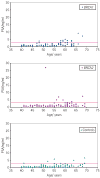Targeted prostate cancer screening in men with mutations in BRCA1 and BRCA2 detects aggressive prostate cancer: preliminary analysis of the results of the IMPACT study
- PMID: 20840664
- PMCID: PMC6057750
- DOI: 10.1111/j.1464-410X.2010.09648.x
Targeted prostate cancer screening in men with mutations in BRCA1 and BRCA2 detects aggressive prostate cancer: preliminary analysis of the results of the IMPACT study
Abstract
Objective: To evaluate the role of targeted prostate cancer screening in men with BRCA1 or BRCA2 mutations, an international study, IMPACT (Identification of Men with a genetic predisposition to ProstAte Cancer: Targeted screening in BRCA1/2 mutation carriers and controls), was established. This is the first multicentre screening study targeted at men with a known genetic predisposition to prostate cancer. A preliminary analysis of the data is reported.
Patients and methods: Men aged 40-69 years from families with BRCA1 or BRCA2 mutations were offered annual prostate specific antigen (PSA) testing, and those with PSA > 3 ng/mL, were offered a prostate biopsy. Controls were men age-matched (± 5 years) who were negative for the familial mutation.
Results: In total, 300 men were recruited (205 mutation carriers; 89 BRCA1, 116 BRCA2 and 95 controls) over 33 months. At the baseline screen (year 1), 7.0% (21/300) underwent a prostate biopsy. Prostate cancer was diagnosed in ten individuals, a prevalence of 3.3%. The positive predictive value of PSA screening in this cohort was 47·6% (10/21). One prostate cancer was diagnosed at year 2. Of the 11 prostate cancers diagnosed, nine were in mutation carriers, two in controls, and eight were clinically significant.
Conclusions: The present study shows that the positive predictive value of PSA screening in BRCA mutation carriers is high and that screening detects clinically significant prostate cancer. These results support the rationale for continued screening in such men.
© 2010 THE INSTITUTE OF CANCER RESEARCH. BJU INTERNATIONAL © 2010 BJU INTERNATIONAL.
Conflict of interest statement
There are no conflicts of interest to declare.
Figures
References
-
- The Breast Cancer Linkage Consortium. Cancer risks in BRCA2 mutation carriers. J Natl Cancer Inst. 1999;91:1310–6. - PubMed
-
- Thompson D, Easton DF. Cancer Incidence in BRCA1 mutation carriers. J Natl Cancer Inst. 2002;94:1358–65. - PubMed
-
- Schröder FH, Bangma CH. The European Randomized Study of Screening for Prostate Cancer (ERSPC) Br J Urol. 1997;79(Suppl 1):68–71. - PubMed
-
- Prorok PC, Andriole GL, Bresalier RS, et al. Prostate, Lung, Colorectal and Ovarian Cancer Screening Trial Project Team. Design of the the Prostate, Lung, Colorectal and Ovarian (PLCO) Cancer Screening Trial. Control Clin Trials. 2000;21(Suppl):273–309. - PubMed
-
- Donovan J, Hamdy F, Neal D, et al. Prostate Testing for Cancer and Treatment (ProtecT) feasibility study. Health Technol Assess. 2003;7:1–88. - PubMed
Publication types
MeSH terms
Substances
Grants and funding
LinkOut - more resources
Full Text Sources
Medical
Research Materials
Miscellaneous



